| Potez XIX Bn2 | |
|---|---|
 | |
| Role | Night bomber |
| Manufacturer | Potez |
| First flight | 1923 |
| Number built | 1 |
The Potez XIX was a prototype French night bomber built by Potez in the 1920s.
| Potez XIX Bn2 | |
|---|---|
 | |
| Role | Night bomber |
| Manufacturer | Potez |
| First flight | 1923 |
| Number built | 1 |
The Potez XIX was a prototype French night bomber built by Potez in the 1920s.
The Potez XIX first flew in 1923 but did not win orders from the French military. Tests of Potez XIX Bp.2 were conducted in Japan from August 31 to October 7, 1925. According to the test results, a small radius of action, a weak bomb load and poor communication between crew members were noted. Naturally, the Japanese military rejected this obsolete bomber. [1]
Data from Airwar : Potez XIX, [1] Aviaafrance :Potez XIX [2] L'Aéronautique December 1923 [3]
General characteristics
Performance
Armament
Related lists

The Hawker Harrier was an experimental biplane torpedo bomber aircraft built by Hawker Aircraft to a specification issued in the 1920s for the RAF.

The Bloch MB.130 and its derivatives were a series of French monoplane reconnaissance-bombers developed during the 1930s. They saw some limited action at the beginning of World War II but were obsolete by that time and suffered badly against the Luftwaffe. After the fall of France, a few were pressed into Luftwaffe service.
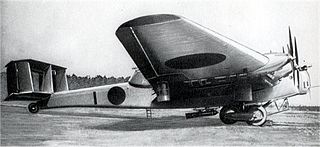
The Mitsubishi Ki-20 is a Japanese bomber variant of the Junkers G.38 airliner. Mitsubishi manufactured six aircraft under license from Junkers. These aircraft, designated Army Type 92 Heavy Bomber, served through the 1930s. During World War II, the Ki-20 served in a variety of transport and support roles.

The WZ.X was the Polish reconnaissance aircraft designed in the mid-1920s and manufactured in the Centralne Warsztaty Lotnicze (CWL) - Central Aviation Workshops in Warsaw. It was the first combat aircraft of own design built in Poland, in a small series.
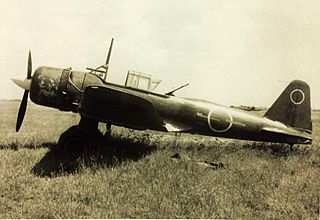
The Mitsubishi Ki-51 was a light bomber/dive bomber in service with the Imperial Japanese Army during World War II. It first flew in mid-1939. Initially deployed against Chinese forces, it proved to be too slow to hold up against the fighter aircraft of the other Allied powers. However, it performed a useful ground-attack role in the China-Burma-India theater, notably from airfields too rough for many other aircraft. As the war drew to a close, the Japanese began using them in kamikaze attacks. Total production was around 2,385 units.
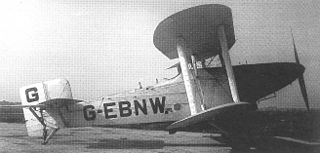
The Avro 571 Buffalo was a prototype British carrier-based torpedo bomber biplane, designed and built by Avro in the 1920s. It was not selected for service, the Blackburn Ripon being ordered instead.
The Potez XV was a French single-engine, two-seat observation biplane designed as a private venture by Louis Coroller and built by Potez and under licence in Poland.
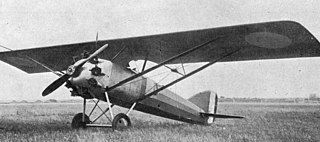
The Gourdou-Leseurre GL.30 was a racing aircraft built in France in 1920 which formed the basis for a highly successful family of fighter aircraft based on the same design.
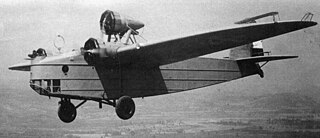
The Dornier Do Y was a German bomber of the 1930s, the second bomber design by Dornier Flugzeugwerke.

The Potez 32 and its military version the Potez 33 was a single-engine French monoplane transport built by Potez and based on the Potez 29 biplane.

The Lioré et Olivier LeO 20 was a French night-bomber aircraft built by Lioré et Olivier.

The Letord Let.5 was probably the most numerous of a family of 3-seat reconnaissance bombers, designed and built in France from 1916, originally to an A3 specification from the STAé.

The Potez 75 was a low-cost, simple, ground-support, observation and launch aircraft for anti-tank missiles, designed and built in the early 1950s, for use in colonial conflicts. One hundred and fifteen were ordered in 1956, but cancelled in 1957.

The Potez VIII was a French training aircraft which first flew in 1920. Originally it had a very unusual vertical inline engine and a four-wheeled undercarriage, though the production version was more conventional.

The Potez 35 was a twin engine bomber aircraft, designed and built in France in the late 1920s. Only one was completed.

The SAB AB-80 was a French bomber built in 1934 by the Société Aérienne Bordelaise (SAB) in Bordeaux.
The Potez 27 was a French reconnaissance biplane first flown in 1924. 175 were operated by the Polish Air Force, most built in Poland by PWS under licence. Others went to Romania, where they were also used as light bombers.

The Bréguet XI was a prototype French biplane bomber of the First World War.
The Dewoitine D.720 T3 was a French reconnaissance/cooperation aircraft built by Dewoitine in the late 1930s.
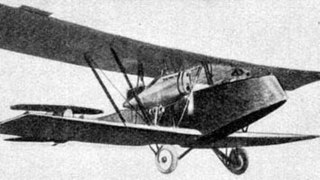
The Breda A.3 was a prototype twin-engined biplane, designed by Società Italiana Ernesto Breda, as a night bomber in 1924.